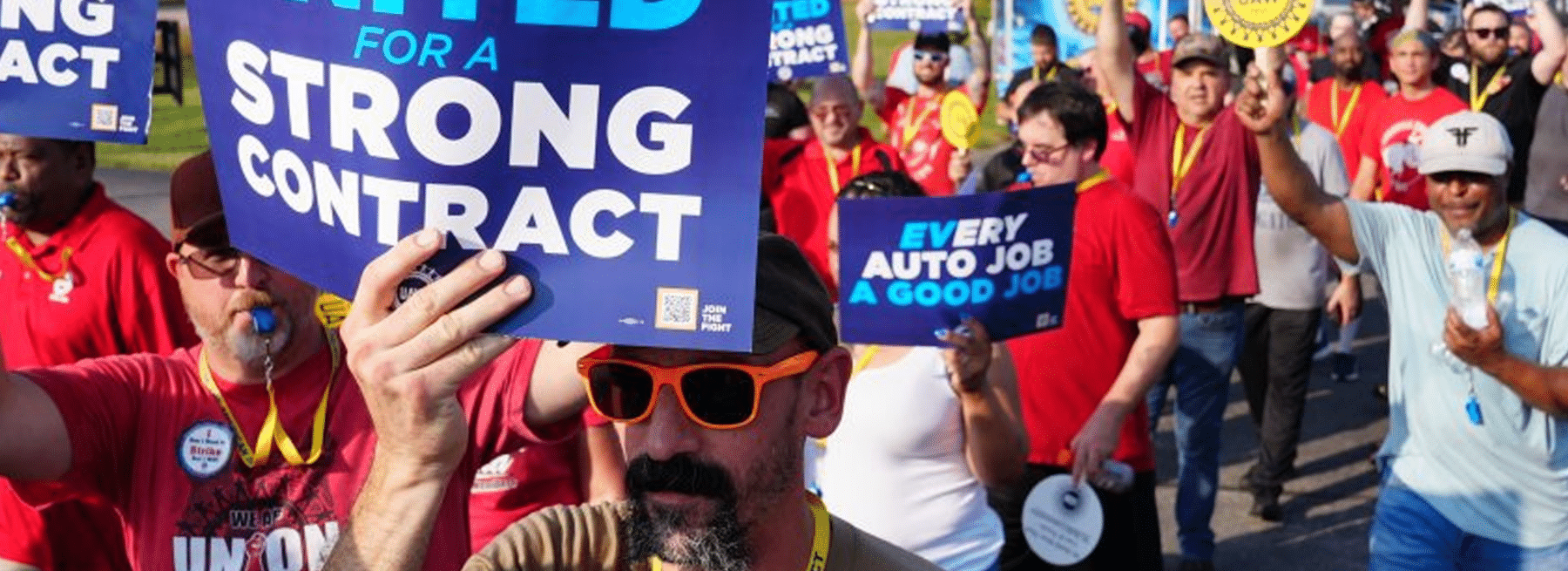Based on a significant labor dispute in the automotive industry, the United Auto Workers (UAW) strike against the Detroit-Three automakers reverberates far beyond the manufacturing plants. It largely affects dealerships across the United States.
This walkout consists of almost 10,000 out of GM’s approximately 46,000 UAW workforce. That’s about 20% of GM’s workforce on strike, 14% for Ford, and almost 20% for Stellantis. This is a dangerous position for GM as the last strike in 2019 cost the company more than $3 billion in lost operating profit. That strike ran for 40 days with each day burning $90 million according to Barron’s story. The story quotes a Wells Fargo analyst who predicts the strike may last about 45 days.
The UAW strike has multifaceted impacts on dealerships. Fortunately, it’s possible for dealerships to employ a comprehensive array of mitigation strategies to ensure their resilience during uncertain times.
How the UAW Strike Affects Dealerships
The impact of the UAW strike on dealerships will depend on how long the strike lasts and how widespread it is. However, some of the potential impacts include reducing the inventory of new vehicles, depressing the profitable parts business, delaying vehicle repairs, and reducing sales. Here’s a look at each.
Reducing inventory of new vehicles
If the strike lasts for a significant period of time, it could lead to a substantial reduction of new vehicle inventory at dealerships. It could make it more difficult for customers to find the vehicle they want.
This ripple effect from the manufacturing plants directly impacts dealerships in several profound ways. Dealerships are faced with a limited inventory of vehicle models, which can have dire consequences on customer choice. Customers may find themselves unable to access their preferred models, leading to potential lost sales opportunities.
The reduced inventory can significantly affect pricing dynamics. With demand often exceeding supply, dealerships may need to reevaluate their pricing strategies, potentially compromising profit margins to remain competitive.
The ability to manage inventory effectively becomes increasingly challenging during a UAW strike. Dealers must navigate the delicate balance between fulfilling current orders, satisfying customer demands, and optimizing stock levels. A limited inventory often results in higher prices. This can cause many customers to put off purchases until the strike is over.
Depress the profitable parts business
Selling auto parts and providing services around parts is one of the most profitable facets of a dealership’s business. It’s also one of the most vulnerable. The supply chain snarls from the pandemic have damaged the car parts business.
There were fewer parts available, and they cost more. Additionally, the parts inventory is dependent on just-in-time shipments. Any kind of breakdown in the supply chain greatly delays the parts and repairs. Dealerships have long struggled with obtaining parts and components.
Service department employees may find themselves overworked due to increased repair times, potentially leading to lower morale and productivity. Unhappy employees can affect the business as they won’t be their best selves on the job. And customers will notice.
Delaying vehicle repairs
While less immediately visible, the UAW strike indirectly impacts dealerships’ service departments, causing substantial delays in vehicle repairs. Part of this stems from dealerships having trouble sourcing the parts they need. This will be especially frustrating for customers who rely on their vehicles for work or other essential activities.
Any disruptions in the supply chain can result in adding a barrier to obtaining essential replacement parts. This, in turn, can lead to extended repair times and frustrated customers.
Customers who own vehicles by these three manufacturers may find themselves unable to get their vehicles repaired. When the dealership can’t source the part, the repair can’t happen. The prolonged repair time could create a huge backlog of vehicles needing servicing. This can erode customer satisfaction and harm the reputation of a dealership service center.
Customers may not be able to use their vehicles at all. They could be forced to rely on public transportation or ridesharing services, which aren’t cheap. Customers may not be able to get to work, which affects their ability to earn a salary. The domino effect could be a serious problem.
Reducing sales
With fewer new vehicles available, the strike could bring about reduced car sales at dealerships. Customers may be hesitant to buy a new car with the limited inventory. They could also put off having their car serviced during the strike. This could lead to financial hardship for dealerships and their employees.
As uncertainty looms over vehicle availability and pricing, fewer potential customers may enter through the dealership’s doors. Obviously, higher prices could mean fewer sales, which hit the bottom line. Customers who cannot find their desired vehicle or face longer wait times may be unhappy. This could potentially damage the dealership’s reputation and future business prospects.
In addition to these direct impacts, the UAW strike could also have many indirect impacts on dealerships. For example, the strike could lead to a slowdown in the overall economy, which could reduce consumer spending on vehicles. The strike could also lead to supply chain disruptions, which could make it more difficult for dealerships to obtain the vehicles and parts they need.
What Can Dealerships Do to Help Mitigate the Effects of the UAW Strike?
Based on the impacts, it is important for dealerships to be prepared for the potential side effects of the strike and to take steps to help mitigate them. One way to do that is to proactively increase inventory levels of popular vehicles. This can help dealerships maintain a consistent supply for customers and capitalize on potential price fluctuations. Of course, this may not be possible.
The next thing to do is put contingency plans into effect. These may include identifying alternative sources for parts and deploying temporary staff to ensure vehicle repairs continue as seamlessly as possible.
Dealerships can attract and retain customers by offering incentives such as discounts, special financing, or loyalty programs to those willing to wait for their preferred vehicle model.
In anticipation of potential labor unrest during the strike, dealerships should implement comprehensive security measures to help safeguard their premises, staff, and inventory. To protect the business and profitability, dealerships may be forced to cut staffing during the strike. With fewer people on the lot, it puts security at risk.
Savvy organized crime gangs and other criminals know dealerships are vulnerable during the UAW strike. They may decide to target dealerships to take advantage of the reduced staffing and change focus to survival mode. Dealerships will be doing whatever they can to stay in business and keep customers happy when they have limited resources. They may not pay attention to security.
It’s possible some picketing and protests by UAW strikers could occur outside of dealerships. This could lead to increased tensions and the potential for violence. Out of frustration or anger, strikers may damage property by committing arson or vandalism at dealerships.
How to Help Protect the Dealership During and After the UAW Strike
The most valuable way to secure a dealership is with multiple layers of security. This includes lighting, limiting entry points, landscaping, video cameras, and strict key management guidelines. However, you can have all the right security measures in place, but employees can make a mistake that puts the dealership at risk for theft and damage. For example, they may not lock a vehicle (especially in the service department,) or neglect to secure gates, doors, or keys.
Therefore, one of the most effective ways to secure your dealership is by implementing video surveillance with remote monitoring. The proactive security service comes with multiple security layers. Plus, it lets someone else take care of the dealership’s security without their being on the dealership lot. Dealerships can focus on what they do best while leaving security to the experts.
Trained monitoring operators watching the cameras can monitor the entire lot and its surroundings and work in conjunction with video analytics. As soon as they see something suspicious, they can respond appropriately. They can even issue a warning to intruders on the dealership lot through an onsite speaker.
The video surveillance system can save all recordings that can be used as evidence. Some dealerships use the recordings to find more efficient ways of managing employees and even in training.
The UAW strike casts a substantial shadow over dealerships as it can potentially affect inventory, repair services, and sales. However, by proactively implementing mitigation strategies, including stocking up on inventory, developing contingency plans, offering incentives, and ensuring robust security measures, dealerships can effectively navigate the stormy times around the strike and emerge stronger after the strike ends.
Remaining vigilant, informed, and adaptable will be the key to successfully managing the situation and maintaining customer satisfaction throughout this challenging time. Dealerships that implement these strategies may not only weather the storm but also position themselves for success in the post-strike automotive landscape. The security investment will continue to pay off after the strike ends.
You can maximize your security investment by working with a security vendor with experience in designing proactive security systems for dealerships. For example, one of Stealth Monitoring’s dealership clients reported they stopped spending $20k per month on customer damage claims thanks to Stealth’s video surveillance and remote monitoring. The client saw a speedy return on their investment.
To learn more about proactive dealership security, pick up this guide to four auto dealership theft trends. If you have questions, please contact us.
Texas Private Security License Number: B14187
California Alarm Operator License Number: ACO7876
Florida Alarm System Contractor I License Number: EF20001598
Tennessee Alarm Contracting Company License Number: 2294
Virginia Private Security Services Business License Number: 11-19499
Alabama Electronic Security License # 002116
Canada TSBC License: LEL0200704

